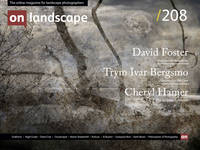The Battle for the Informative Image

Keith Beven
Keith Beven is Emeritus Professor of Hydrology at Lancaster University where he has worked for over 30 years. He has published many academic papers and books on the study and computer modelling of hydrological processes. Since the 1990s he has used mostly 120 film cameras, from 6x6 to 6x17, and more recently Fuji X cameras when travelling light. He has recently produced a second book of images of water called “Panta Rhei – Everything Flows” in support of the charity WaterAid that can be ordered from his website.
Basically, therefore, photographers wish to produce states of the things that have never existed before; they pursue these states, not out there in the world, since for them the world is only a pretext for the states of things that are to be produced, but among the possibilities of the camera’s program. To this extent, the traditional distinction between realism and idealism is overturned in the case of photography: it is not the world out there that is real, nor is the concept within the camera’s program – it is only the photograph that is real.” “We are dealing here with a reversal of the vector of significance: it is not the significance that is real, but the signifier, the information, the symbol and this reversal … is characteristic of the post-industrial world in general - Vilém Flusser, 1983: The Gesture of Photography
And then, straight after submitting my last article to On Landscape1, I started reading a book by Vilém Flusser2(1920-1991) that expressed views almost completely opposed to what I had suggested in that article about the representation of reality. Flusser suggests that it is only the photograph that can be real; it cannot be the reality that was photographed (see the leading quotation above3). That is, of course, true to an extent. I had already noted in that article that our images depend on technology outside our control but had expressed the view that they might be representations of reality as experienced, in so far as they do not stray too far from what the eye saw at the time.4
"Quick Definitions"
Semiotics - study of signs and symbolsPost-Structuralism - the idea that things need analysing in their proper context, not in isolation
Post-Modernism - A rejection of turn of the century 'big thinking' around art. - Ed
The book by Flusser, Thoughts on a Philosophy of Photography, was written in 1983, so well before the proliferation of digital imaging, but at a time in philosophy when semiotics, post-structuralism and post-modernism [were in full flow. He wrote about photography as a post-industrial activity in which the camera as a machine or apparatus was used to produce images to satisfy the photographic program. The photographic program he envisaged (already in 1983) as the potential to produce images of everything and everywhere: “the sum of all those photographs that can be taken by a camera”. He does not define a philosophy of photography as such but rather sets out what a philosophy of photography would have to deal with in the post-industrial age. In particular, he suggests that rather than the photographer using the camera to provide information, one of the features of the photographic program is that the camera is using the photographer as a means of continuing its development (and the continuation of all the industrial complex that lies behind it). This is certainly an interesting alternative perspective on the modern memes of gear acquisition syndrome and the manufactured demand for ever more megapixels when most images are not shown at greater resolutions than the humble phone or computer screen.

